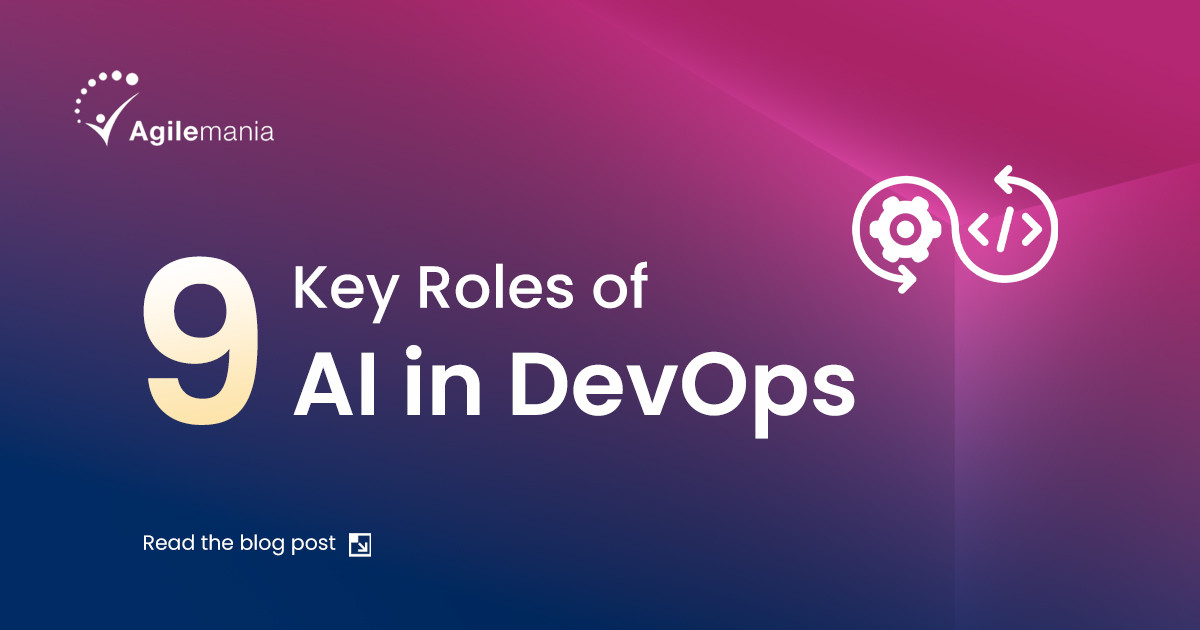
Agilemania
Agilemania, a small group of passionate Lean-Agile-DevOps consultants and trainers, is the most tru... Read more

Agilemania
Agilemania, a small group of passionate Lean-Agile-DevOps consultants and trainers, is the most tru... Read more

The digital age demands constant innovation, and DevOps has emerged as a powerful tool for businesses to achieve this. By bridging the gap between development and operations, DevOps accelerates software delivery and streamlines workflows. However, DevOps teams often find themselves caught in a tug-of-war between velocity and visibility.
On one hand, the need to deliver features quickly pushes for automation and rapid deployments. On the other hand, ensuring application quality and security requires constant monitoring and proactive problem-solving. This creates a knowledge gap, where vast amounts of data are generated, but valuable insights often remain hidden. DevOps engineers struggle to sift through this data deluge, hindering their ability to identify and address issues before they impact customers.
Here's where Artificial Intelligence (AI) steps in as a game-changer. By leveraging AI's analytical prowess, DevOps teams can unlock the true potential of their data. This blog post will explore 9 key roles AI can play in the DevOps world, helping teams achieve faster deployments, improved application quality, and enhanced security.
DevOps thrives on automation, a key ingredient for streamlining software development and boosting efficiency. Traditionally, this automation relied on predefined rules and scripts. However, the introduction of Artificial Intelligence (AI) and Machine Learning (ML) brings a new level of sophistication to the table.
AI and ML algorithms can handle a wide range of repetitive tasks that often bog down DevOps teams. These include:
Code Analysis and Testing: AI-powered tools can analyze code for potential bugs and vulnerabilities, automating much of the testing process and freeing up engineers for more complex tasks.
Deployment Automation: ML algorithms can learn from past deployments and automate the deployment process, ensuring consistency and reducing the risk of errors.
Infrastructure Management: AI can continuously monitor infrastructure performance and automatically scale resources to meet changing demands.
Performance Optimization: ML can analyze vast amounts of performance data to identify bottlenecks and suggest optimizations, improving application stability and responsiveness.
This powerful integration between AI and DevOps goes beyond simple automation. By leveraging machine learning's analytical capabilities, DevOps teams can gain valuable insights from their data.
While automation has been a cornerstone of DevOps practices, AI and Machine Learning (ML) are ushering in a new era of intelligent automation and data-driven decision-making.
Let's delve into 9 key roles AI plays in transforming DevOps:
AI-powered tools can automate tedious testing processes, significantly accelerating development cycles. These intelligent tools can identify defects and vulnerabilities with high precision, surpassing the capabilities of traditional manual testing.
AI can analyze historical data from deployments to uncover patterns and trends. This foresight allows DevOps teams to anticipate potential issues before they arise, enabling proactive measures and ensuring application stability.
AI-powered monitoring solutions can continuously scan infrastructure and applications, identifying potential problems before they snowball into major outages. This proactive approach minimizes downtime and safeguards application reliability.
Repetitive tasks that drain valuable developer resources can be intelligently automated using AI. This frees up engineers to focus on more strategic initiatives and complex problem-solving. Imagine chatbots powered by AI handling routine customer inquiries, allowing DevOps teams to tackle more challenging technical issues.
Agilemania's SAFe® DevOps Practitioner (SDP) Certification course equips you with the essential skills and knowledge to optimize your DevOps practices within the SAFe framework.
Register Now
AI-powered collaboration tools can foster better communication and teamwork within DevOps teams. Virtual assistants and chatbots can streamline information sharing and ensure team members have the data they need to perform their tasks effectively.
AI can analyze workflows and identify bottlenecks or areas for improvement. This data-driven approach empowers teams to optimize processes, leading to increased efficiency and productivity.
AI can bolster security by automating threat detection and response. By continuously monitoring for suspicious activity and identifying potential vulnerabilities, AI safeguards applications and infrastructure from cyberattacks.
AI-powered analytics can rapidly pinpoint operational issues, allowing for swift resolution. This translates to a significant reduction in Mean Time to Recovery (MTTR), minimizing downtime and ensuring optimal application performance.
AI can analyze vast amounts of performance data, providing valuable insights into application behavior. These insights empower developers to identify and address performance bottlenecks, leading to a more responsive and user-friendly application experience.
While AI offers a powerful toolkit for DevOps teams, it's crucial to acknowledge its limitations to ensure successful implementation. Here are some key roadblocks to consider:
1. The Black Box Conundrum: Some AI systems operate as opaque "black boxes," making it difficult to understand their decision-making process. This lack of transparency can hinder troubleshooting and debugging AI-driven recommendations, potentially leading to unforeseen consequences. Imagine an AI suggesting a deployment strategy, but developers have no insight into the rationale behind the recommendation. This lack of clarity can erode trust and hinder adoption.
2. Garbage In, Garbage Out: The effectiveness of AI hinges on the quality and quantity of data it's trained on. Biased or insufficient data can lead to inaccurate or biased results. For instance, an AI trained on historical data that favored a specific cloud provider might consistently recommend that provider, even if a more cost-effective option exists. Rigorous data governance practices are essential to ensure the integrity of AI-powered insights.
3. The Cost Equation: Implementing AI solutions can be a significant financial investment. Costs associated with hardware, software, and specialized expertise can quickly add up. Organizations need to carefully evaluate the return on investment (ROI) before embarking on AI integration. Is the potential gain in efficiency worth the upfront cost?
4. The Talent Gap: Developing and deploying AI solutions effectively requires specialized skills and knowledge. Many organizations might lack the in-house expertise necessary to manage AI tools. This talent gap can create challenges in deploying and maintaining AI technologies, potentially hindering long-term success.
5. The Error Frontier: AI systems are not infallible. They can make mistakes, especially when dealing with complex or nuanced situations. Organizations need to establish robust error detection and mitigation strategies to address potential issues arising from AI-driven decisions. This may involve incorporating human oversight into critical decision-making processes.
|
Best Practices |
Actions to Take |
| Start Small and Scale Up | Begin with a focused project to gain experience with AI's capabilities and limitations before undertaking larger deployments. |
| Build a Collaborative Team | Involve developers, IT operations, and business leaders from the outset to ensure AI adoption aligns with overall goals. |
| Continuously Monitor and Refine | Regularly assess AI tools to confirm they deliver expected benefits and adapt them based on ongoing learnings and best practices. |
| Transparency and Responsibility | Ensure clear communication on how AI is used, the data it relies on, and any potential biases. Establish clear ownership for AI-driven processes. |
| Prioritize Data Quality and Security | Implement data governance policies and secure storage solutions to guarantee high-quality and secure data for AI operations. |
| Human-AI Partnership | Leverage AI for automation, but involve humans in critical decision-making for optimal outcomes. |
Master the essential skills with our guidance and step into the future of technology as a DevOps Engineer. Unlock the door to success in technology. Start your journey to becoming a sought-after DevOps Engineer in 2024 with our expert-led roadmap.
Register Today!
The future of AI in DevOps is brimming with exciting possibilities. While current applications focus on automating tasks and improving efficiency, the next wave of AI advancements promises to revolutionize the very nature of DevOps practices.
Machine learning models will move beyond basic automation, taking a more proactive role in resource management. The future holds the potential for AI to not just analyze code but also actively improve it.
A whopping 38% areas of development and operations are expected to require artificial intelligence skills over the next 12 months in 2023, as per Statista.
By leveraging its predictive capabilities, intelligent automation, and integration with emerging technologies, AI will transform DevOps into a proactive and data-driven discipline
The DevOps landscape is undergoing a seismic shift. Fueled by the power of AI, teams are now equipped to automate repetitive tasks, gain deeper insights from data, and optimize workflows for unparalleled efficiency. The nine key roles explored in this blog post showcase the transformative potential of AI in DevOps.
While limitations exist, a thoughtful approach that emphasizes transparency, data quality, and responsible AI adoption can pave the way for a successful integration journey. The future of DevOps is intelligent, and the possibilities are boundless.
So, are you ready to embrace AI and unlock the next level of innovation in your software development process?
AI is designed to augment DevOps engineers, not replace them. By automating repetitive tasks, AI frees up engineers to focus on higher-level activities like strategic planning and complex problem-solving.
Start by identifying a specific area in your DevOps workflow that can benefit from AI. Evaluate various AI-powered tools available and choose one that aligns with your needs. Begin with a pilot project to gain experience and gradually expand AI adoption as you learn more.
Security is paramount. Ensure the AI tools you use are trustworthy and that the data they rely on is secure and unbiased. Maintain clear oversight and human involvement in critical decision-making processes.
Agilemania, a small group of passionate Lean-Agile-DevOps consultants and trainers, is the most trusted brand for digital transformations in South and South-East Asia.
WhatsApp Us
We will get back to you soon!
For a detailed enquiry, please write to us at connect@agilemania.com

